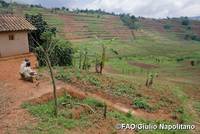Sustainable Land Management Tools
Sustainable agronomic practices and treatments have been developed by FAO over the years. They often enhance the soil quality in its soil nutrient content and nutrient availability and in its resistance to soil degradation. Rotations, integrated use of fertilizers, organic farming, good agricultural practices, conservation agriculture are programmes that benefit the soil and are discussed through links with existing FAO websites.
FAO Good Agricultural Practices
A multiplicity of Good Agricultural Practices (GAP) codes, standards and regulations have been developed in recent years by the food industry and producers organizations but also governments and NGOs, aiming to codify agricultural practices at farm level for a range of commodities. Their purpose varies from fulfilment of trade and government regulatory requirements (in particular with regard to food safety and quality), to more specific requirements of speciality or niche markets.
Conservation Agriculture
Conservation agriculture (CA) aims to achieve sustainable and profitable agriculture and subsequently aims at improved livelihoods of farmers through the application of the three CA principles: minimal soil disturbance, permanent soil cover and crop rotations. It is a way to combine profitable agricultural production with environmental concerns and sustainability and it has been proven to work in a variety of agroecological zones and farming systems. It has been perceived by practitioners as a valid tool for Sustainable Land Management (SLM).
IPNM
Integrated Plant Nutrient Management (IPNM) embraces soil, nutrient, water, crop, and vegetation management practices, tailored to a particular cropping and farming system, undertaken with the aim of improving and sustaining soil fertility and land productivity and reducing environmental degradation. Integrated Plant Nutrient Management aims to optimize the condition of the soil, with regard to its physical, chemical, biological and hydrological properties, for the purpose of enhancing farm productivity, whilst minimizing land degradation.

